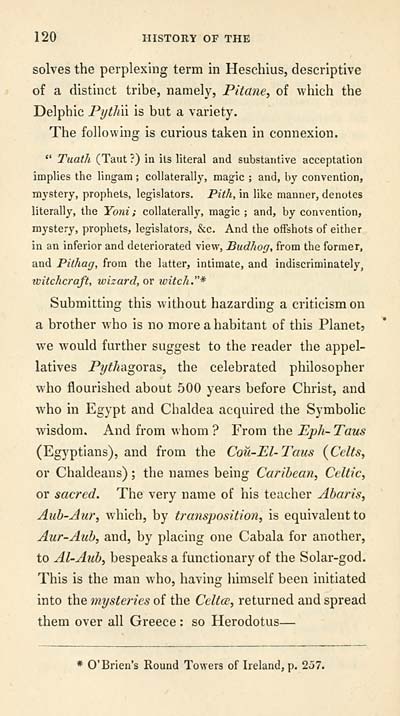Download files
Complete book:
Individual page:
Thumbnail gallery: Grid view | List view

120 HISTORY OF THE
solves the perplexing term in Heschius, descriptive
of a distinct tribe, namely, Pitane, of which the
Delphic Pytlm is but a variety.
The following is curious taken in connexion.
" Tuatli (Taut ?) in its literal and substantive acceptation
implies the lingam ; collaterally, magic ; and, by convention,
mystery, prophets, legislators. Pith, in like manner, denotes
literally, the Yoni ; coUaterall}', magic ; and, by convention,
mystery, prophets, legislators, &c. And the ofFshots of either
in an inferior and deteriorated view, Budhog, from the former,
and Pithag, from the latter, intimate, and indiscriminately,
witchcraft, wizard, or witch."*
Submitting this without hazarding a criticism on
a brother who is no more a habitant of this Planet,
we would further suggest to the reader the appel-
latives PytJiAgoras, the celebrated philosopher
who flourished about 500 years before Christ, and
who in Egypt and Chaldea acquired the Symbolic
wisdom. And from whom ? From the Eph- Taus
(Egyptians), and from the Cou-El-Taus {Celts,
or Chaldeans) ; the names being Carihean, Celtic,
or sacred. The very name of his teacher Abaris,
Aub-Aur, which, by transposition, is equivalent to
Aur-Aub, and, by placing one Cabala for another,
to Al-Aiib, bespeaks a functionary of the Solar-god.
This is the man who, having himself been initiated
into the mysteries of the Celtce, returned and spread
them over all Greece : so Herodotus —
* O'Brien's Round Towers of Ireland, p. 257.
solves the perplexing term in Heschius, descriptive
of a distinct tribe, namely, Pitane, of which the
Delphic Pytlm is but a variety.
The following is curious taken in connexion.
" Tuatli (Taut ?) in its literal and substantive acceptation
implies the lingam ; collaterally, magic ; and, by convention,
mystery, prophets, legislators. Pith, in like manner, denotes
literally, the Yoni ; coUaterall}', magic ; and, by convention,
mystery, prophets, legislators, &c. And the ofFshots of either
in an inferior and deteriorated view, Budhog, from the former,
and Pithag, from the latter, intimate, and indiscriminately,
witchcraft, wizard, or witch."*
Submitting this without hazarding a criticism on
a brother who is no more a habitant of this Planet,
we would further suggest to the reader the appel-
latives PytJiAgoras, the celebrated philosopher
who flourished about 500 years before Christ, and
who in Egypt and Chaldea acquired the Symbolic
wisdom. And from whom ? From the Eph- Taus
(Egyptians), and from the Cou-El-Taus {Celts,
or Chaldeans) ; the names being Carihean, Celtic,
or sacred. The very name of his teacher Abaris,
Aub-Aur, which, by transposition, is equivalent to
Aur-Aub, and, by placing one Cabala for another,
to Al-Aiib, bespeaks a functionary of the Solar-god.
This is the man who, having himself been initiated
into the mysteries of the Celtce, returned and spread
them over all Greece : so Herodotus —
* O'Brien's Round Towers of Ireland, p. 257.
Set display mode to: Large image | Transcription
Images and transcriptions on this page, including medium image downloads, may be used under the Creative Commons Attribution 4.0 International Licence unless otherwise stated. ![]()
| Early Gaelic Book Collections > Blair Collection > History of the Celtic language > (126) |
|---|
| Permanent URL | https://digital.nls.uk/76179995 |
|---|
| Description | A selection of books from a collection of more than 500 titles, mostly on religious and literary topics. Also includes some material dealing with other Celtic languages and societies. Collection created towards the end of the 19th century by Lady Evelyn Stewart Murray. |
|---|
| Description | Selected items from five 'Special and Named Printed Collections'. Includes books in Gaelic and other Celtic languages, works about the Gaels, their languages, literature, culture and history. |
|---|

